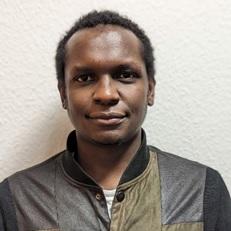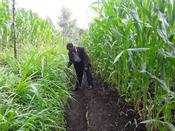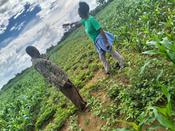Denis Momanyi
At the Albrecht Daniel Thaer- Institute of Humboldt-University, Denis Momanyi develops a people-centric assessment framework for the climate-smartness and resilience in agroecologically diverse smallholding zones in Kenya.
May 07, 2024
Denis Momanyi is pursuing doctoral studies at Humboldt University. He is part of the Resource Economics Group of Albrecht Daniel Thaer-Institute and the Integrative Research Institute on Transformations of Human-Environment Systems (IRI THESys). Additionally, he is an affiliate doctoral researcher at the Sustainable Land Use in Developing Countries (SusLAND) working/research group at the Leibniz-Centre for Agricultural Landscape Research (ZALF), Müncheberg, Germany, and the York Institute for Tropical Ecosystems (KITE) at the University of York, UK.
As an Elsa-Neumann-Scholarship fellow, Denis works under the supervision of Prof. Dr. Hermann Lotze-Campen (Potsdam Institute for Climate Impact Research (PIK), IRI THESys & HU Berlin) and Prof. Dr. Stefan Sieber (SusLAND, ZALF & HU Berlin); and externally under Prof. Robert Marchant (KITE & UoY).
Professionally, before starting his PhD, he was a guest/visiting scientist also at SusLAND, ZALF. He has previously held several university tutorial fellowship stints in his native Kenya. Academically, he holds a Master of Science (M.Sc.) in Agricultural and Applied Economics from Egerton University, Kenya, including a semester abroad at the University of Pretoria, South Africa.
Dissertation project: Climate-smartness and resilience within agroecologically diverse rural smallholding zones: A people-centric holistic assessment framework for Kenya
Heterogeneity in climate impacts
Rural smallholder households, comprising both men and women, agricultural systems, and agroecological zones (AEZs) are heterogeneous, implying climate impacts – and the value of adaptation strategies – vary within and between these populations. Climate change is dynamic, locally specific, and manifests differently across genders, AEZs, socioeconomic, socioecological, biophysical, and environmental profiles. Although people, environments, or ecosystems within specific heterogeneous AEZs face or share equal climates, climate change unequivocally metes asymmetric, disproportionate effects, with natural conditions, resource-dependent smallholders, and agroecosystems, arguably, more prone and at risk, given their centrality in agricultural food production systems. It is, therefore, neither likely that they experience climate effects symmetrically, nor have similar adaptive capacities.
Gender disparities and vulnerability
Even more, women, marginalized and disadvantaged smallholders within this already vulnerable category will be most at risk, disproportionately pushed or affected further beyond the overall smallholders’ exposure and vulnerability. This is attributable to inherent, deeply rooted biases and discriminatory sociocultural traditions, beliefs, and norms regarding gender roles, women especially. These include lack of or limited agency; decision-making power; access to, control over, ownership, and use of productive resources, such as land; institutional support-service barriers limiting access to, amongst others, agricultural extension services, financial resources such as credit and loans; and suchlike. What’s more, even within similar AEZs and household headship statuses, greater heterogeneities also persist.
Climate adaptation gaps
Thus following, a key shortfall of previous impact assessments that the current study posits is the sparsity of information on how climate change impacts are distinctively and disparately felt, responded and/or adapted to be incongruous, gender-disaggregated and AEZ-differentiated smallholder groups of Climate-Smart-Agriculture Technologies, Innovations and Management Practices (CSATIMPs) adopters and non-adopters. In this regard, holistic research into the social, economic, and environmental effects or impacts of climate change (including adapting to the effects, through adopting CSATIMPs) that accounts for heterogeneities in both smallholders’ gender and AEZs, have not garnered robust rigour and attention in rural Kenya, in spite CSATIMPs encompassing all three goals.
Policy and strategy challenges
Since the livelihood of the rural-poor Kenyan smallholder is tied to naturally occurring resources (land, soil, rainfall/precipitation, water bodies, etc), policies and strategies addressing climate change and natural resource degradation have been designed. Unfortunately, those policies and strategies had unquantifiable results or impacts, due to inadequate evidence-based research tailored for specific genders and heterogeneous AEZs, at the local micro plot and household, meso communal and village, as well as macro-regional scale and levels.
Innovative pathways for interdisciplinary research
This research argues for greater pluralism in the underlying scientific discourse, by acclimatizing and adapting interdisciplinary agricultural economics methods together with geo-informatics and geospatial tools and techniques – in the spirit of sharing with interfacing disciplines - thus broadening the underlying research methodology, and making concrete the resulting practical, theoretical, and empirical evidence bases. By fostering greater professional interaction among disciplines, novel methods can pinpoint to new sustainability and adaptation pathways. Overall, this research will rely on the triangulation multimethodology to fill fundamental research gaps.
Research funding support
Incidental to the PhD funding support from the Elsa-Neumann-Scholarship of the Federal State of Berlin, Denis has won several grants to support his research stays abroad and fieldwork research activities, namely:
- DAAD-GraFöG top-up grants for a research stay in the University of York, UK, and fieldwork stay in Kenya by the German Academic Exchange Service (DAAD).
- Foundation fiat panis grant to promote fieldwork research projects which are likely to contribute to an improvement in the food-nutritional security situation of people in countries with food deficits.
- The World Wildlife Fund for Nature, Inc. (WWF) Russell E. Train Education for Nature Program (EFN) grant for environmental conservation/preservation fieldwork research.
News
In March-May 2024, Denis travelled to the UK for a research stay at the University of York, where he is being mentored by Prof. Robert Marchant in the Department of Environment and Geography. During his stay, Denis is expected to earn an Institutional Postgraduate Credit in Environment, Economics and Ecology. Further, he is developing his third paper based on a KESHO participatory scenario framework to envision sustainable agroforestry-food security futures in western Kenya, anchoring on his 2023 recent fieldwork in Kenya. The KESHO tool was developed by Rob and his team at York and will be applied to his next fieldwork in Kenya happening later in 2024. Besides, he is taking part in various skill development training and land use change field trips. He also benefited from a week-long scenarios training workshop at the University of St. Andrews, Scotland, with Rob and Dr. Jessica Thorn of the School of Geography and Sustainable Development. His stay is expected to further widen his research scope and methodological rigour, in addition to expanding his research networks, and multicultural and international experience. After his research stay, he is expected to share and train his ZALF colleagues on the KESHO tool, further advancing the capacity of ZALF in future land use scenario modelling.
Between July and September 2023, Denis conducted his first fieldwork to collect data from Western Kenya smallholders. The research was intended to collect data on the gender-informed and AEZ-specific adoption of climate-smart agriculture (CSA) adoption rates, patterns and trends, and the impacts on food-nutrition security. Various individual (farmer), household, farm and AEZ biophysical aspects were collected to inform the drivers of CSA adoption and the resultant adoption impacts on food security. After the fieldwork, Denis travelled back to Germany to begin drafting two research papers to be published under the auspices of his fieldwork research stay. The research was funded by Fiat Panis and WWF. The findings of the study will have important policy implications and provide recommendations for enhancing food security, agroecosystem, and agroecological conservation. The two papers are currently being completed.








